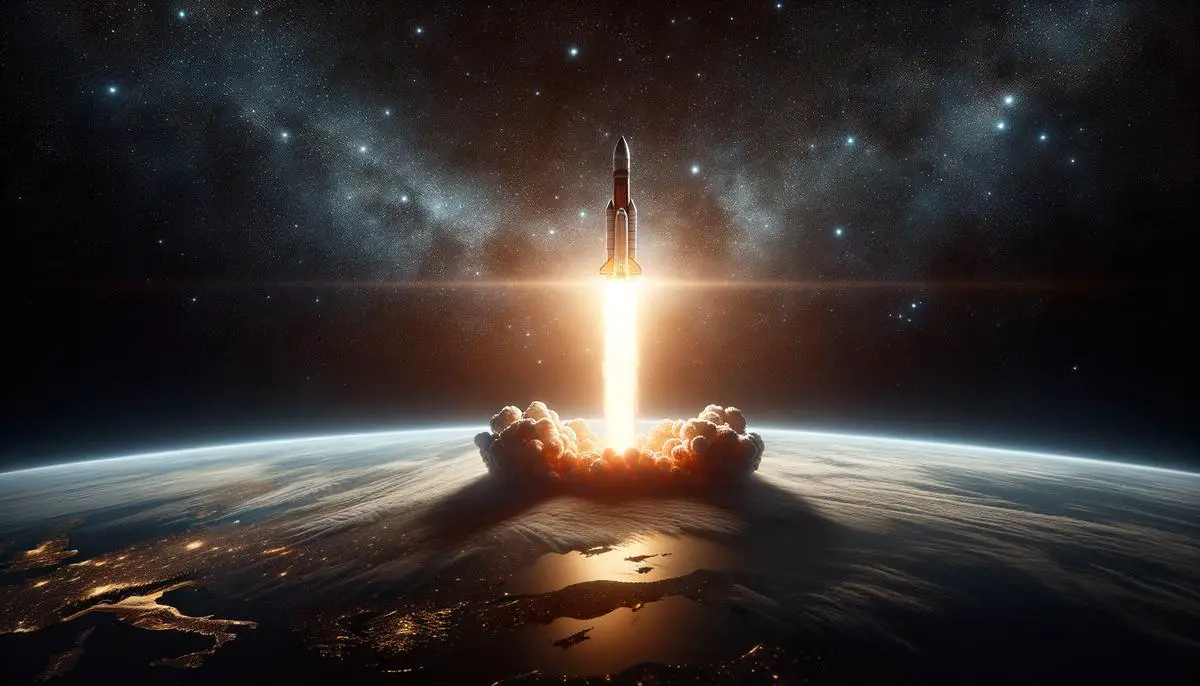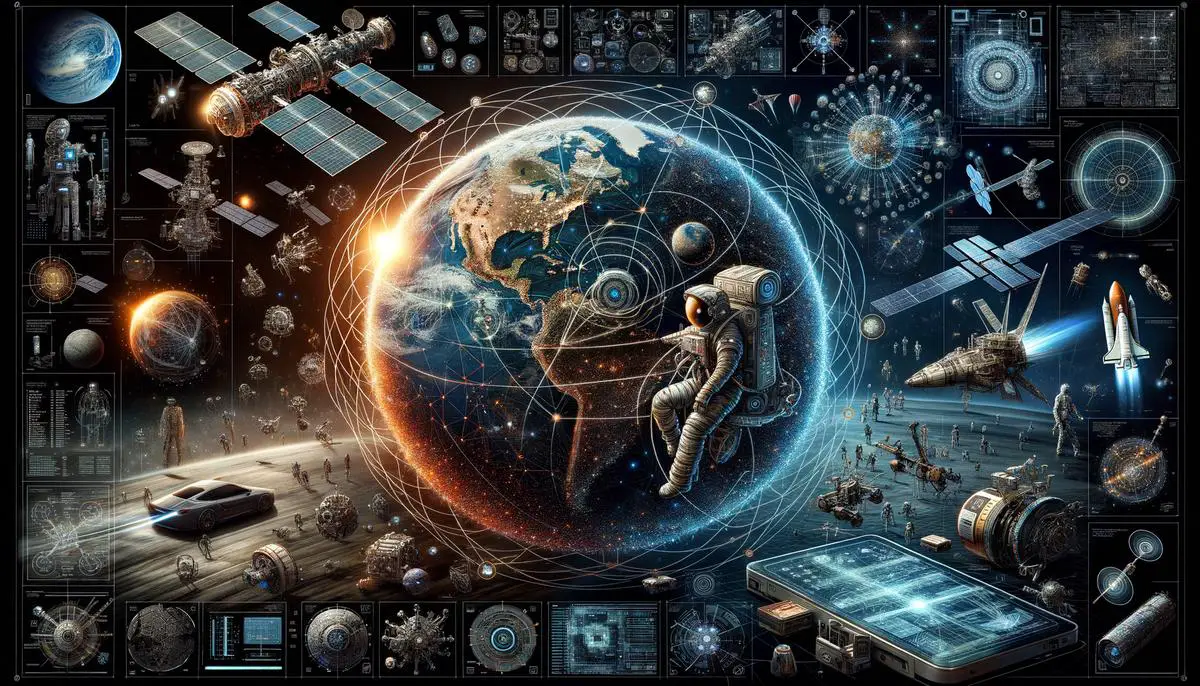Exploring space has always been a defining aspect of humankind’s quest for knowledge. The push to reach beyond our earthly confines drives innovation and leads to technological advancements that shape our understanding of the universe and improve life on Earth. This exploration not only seeks to answer age-old questions about our place in the cosmos but also challenges us to develop new technologies and ideas that have practical applications right here on our home planet.
Technological advancements stemming from space research
Space Exploration: The Engine of Technological Innovation on Earth
Introduction
The journey into space, a realm that stretches beyond the confines of our earthly existence, has long fascinated humanity. The pursuit of uncovering the secrets of the cosmos has not only expanded our understanding of the universe but has also been a significant catalyst for technological innovation right here on our home planet, Earth. The quest to explore space, driven by agencies like NASA and private entities such as SpaceX, has spurred developments that have permeated various aspects of everyday life, from health and safety to communication and environmental sustainability. This exploration delves into the relationship between space exploration and technological advancement, highlighting how the challenges of venturing into space have led to groundbreaking innovations with far-reaching applications on Earth.
The Ripple Effects of Space Exploration on Technology
The daunting environment of space presents unique challenges that require innovative solutions. The extreme conditions—ranging from the vacuum of space to the radiation belts encircling Earth—demand technologies that can withstand and operate within these harsh parameters. In the process of developing these technologies for space missions, spin-off technologies have emerged, offering substantial benefits for terrestrial applications.
Healthcare Innovations from Astronaut CareOne of the most direct beneficiaries of space exploration technologies has been the healthcare sector. The need for compact, efficient medical tools to monitor and support astronauts’ health in space has led to the miniaturization of medical devices and the development of non-invasive diagnostic tools. For instance, digital imaging technology, initially developed to enhance pictures of the Moon, has paved the way for advances in magnetic resonance imaging (MRI) and positron emission tomography (PET) scans. These tools have revolutionized medical diagnostics, enabling early detection and treatment of diseases.
Materials Science BreakthroughsThe drive to design spacecraft and suits that protect astronauts from space’s unforgiving environment has also fueled advancements in materials science. For example, the development of heat-resistant materials capable of withstanding the extreme temperatures experienced during re-entry into Earth’s atmosphere has found applications in firefighting gear, enhancing the safety and effectiveness of firefighters in life-threatening situations. Similarly, memory foam, initially created to improve crash protection for pilots, has been adapted into various consumer products, including mattresses and pillows, enhancing comfort and support for millions of people.
Communication Advancements through Satellite TechnologySpace exploration’s contribution to communication technology is epitomized by the development and deployment of satellites. The global satellite network, vital for space communication, has been instrumental in transforming terrestrial communication networks. Today, thanks to satellite technology, we enjoy GPS navigation, live international broadcasts, and global telecommunications. This network has made the world more connected than ever before, facilitating everything from daily commutes to international decision-making and disaster response.
- Environmental Monitoring for a Sustainable Future
Lastly, the technology developed for observing other planets has been turned back towards Earth, offering unprecedented insights into our environmental challenges. Satellites equipped with sensors initially designed to study extraterrestrial landscapes are now monitoring Earth’s climate, tracking changes in sea levels, forestation, and atmospheric composition. This monitoring is crucial for our understanding and combating climate change, providing data that underpins strategies for a sustainable future.
Conclusion
The entwined history of space exploration and technological innovation demonstrates a striking example of how reaching for the stars can yield tangible benefits on Earth. The challenges of space have necessitated inventions that have, in turn, influenced sectors as diverse as healthcare, materials science, communication, and environmental monitoring. As we continue to push the boundaries of what is possible in space, the ripple effects of these explorations will undoubtedly inspire future innovations, further testament to humanity’s indomitable spirit of discovery and its relentless pursuit of knowledge, both beyond our planet and on it.

Economic impacts of the space industry
Space tourism is emerging as a new frontier in the space industry, presenting significant economic opportunities.
Just imagine, for a moment, stepping aboard a spacecraft to experience the weightlessness of space and gaze upon the Earth from above. This is no longer the realm of astronauts alone—private companies are making it possible for civilians. The allure of space travel is not just about the unique experience; it’s also about the economic ripple effect. As companies develop spacecraft capable of taking tourists into space, they’re also creating jobs for engineers, scientists, and service personnel, not to mention the tourism dollars spent on accommodations, training, and related experiences leading up to the journey.
Moreover, the burgeoning space tourism sector is propelling advancements in aerospace technology. The challenge of making space accessible to non-astronauts requires innovative solutions in rocket design, safety protocols, and consumer-oriented space habitats. These advancements can trickle down to more traditional aerospace applications, improving efficiency and safety for all forms of air and space travel.
Another economic boon of the space industry is in the realm of mining celestial bodies. The concept of extracting resources like water, precious metals, and minerals from the Moon, asteroids, and other planets is stepping out of science fiction and into viable business plans. These resources could support life on other planets or be brought back to Earth to support future technologies and industries. Space mining could revolutionize industries by providing materials that are rare or depleted on Earth, potentially lowering costs for high-tech products and fostering new innovations.
Furthermore, the space industry is pivotal in developing global internet coverage. Companies are launching constellations of small satellites designed to provide high-speed internet to remote and underserved areas around the globe. This endeavor is not just about profits; it’s about uplifting economies by bridging the digital divide, enabling access to education, healthcare, and business opportunities that were previously out of reach for millions.
Investments in space also drive educational and workforce development. Interest in space stimulates STEM (science, technology, engineering, and mathematics) education, preparing the next generation of innovators and problem-solvers. Universities and educational institutions around the world are expanding their aerospace programs to meet the growing demand for skilled professionals in the space industry. This focus on education promotes a knowledgeable, innovative workforce that can propel economies forward not just in space-related fields but across all sectors of technology and innovation.
In wrapping up, the economic benefits and opportunities presented by the space industry are vast and varied. From the immediate impacts of space tourism and its related services to the long-term potential of space mining and global internet coverage, the space industry is a catalyst for economic growth, technological advancement, and educational development. As humanity continues to reach for the stars, the economic landscape back on Earth stands to gain significantly from these stellar endeavors.

Space exploration’s role in scientific discovery
Space exploration, with its boundless quest beyond our earthly confines, has not only propelled humanity into the vast unknown but has fundamentally reshaped our understanding of the universe. This journey, fueled by curiosity and an indomitable spirit of discovery, unravels the cosmos’s mysteries, offering insights that extend far beyond the celestial.
Our pursuit to explore space serves as a lens through which we view the grand tapestry of the cosmos, unveiling the complex dynamics of celestial bodies and the cosmic phenomena that govern our universe. By dispatching probes to distant planets and moons, we gather crucial data that demystify the solar system’s origins, structures, and potential futures. For instance, missions like the Voyager probes, which soared past the outer planets, and the Mars rovers that tread the red soil of the Martian surface, have beamed back invaluable information, revealing the existence of water in these regions and hinting at the possible habitability of extraterrestrial worlds.
Moreover, space exploration actuates a profound understanding of fundamental physics, shedding light on gravitational forces, cosmic radiation, and the intricate dance of galaxies. These explorations have led to pivotal discoveries such as dark matter and dark energy, invisible components that constitute the majority of the universe’s mass and energy, challenging our preconceptions and enriching our cosmic knowledge.
Observing the universe has also been revolutionized by advanced telescopes stationed in space, free from the Earth’s atmospheric distortions. The Hubble Space Telescope, orbiting the planet, has captured awe-inspiring images of distant galaxies, supernova remnants, and nebulae, painting a stunning portrait of the universe’s evolution over billions of years. These observations help astronomers unravel the birth and life cycle of stars, the formation of galaxies, and the universe’s expansion, providing empirical evidence that supports the Big Bang theory.
Additionally, the endeavor to explore space nurtures international collaboration, fostering a shared sense of purpose and unity in the quest for knowledge. Space missions, such as the International Space Station (ISS), exemplify global cooperation, where astronauts from diverse nations live and work together, conducting experiments that advance our understanding of space and its effects on biological organisms. These collaborations highlight the unifying power of scientific exploration, bridging cultural and geopolitical divides in pursuit of common goals.
The quest for extraterrestrial life also occupies a central place in space exploration. By studying extreme environments on Earth where life thrives against odds, scientists develop hypotheses about life’s potential existence on planets with harsh conditions. Efforts to detect exoplanets, planets orbiting stars beyond our sun, employ sophisticated techniques to uncover worlds in habitable zones where liquid water — and possibly life — could exist. These endeavors not only expand our understanding of life’s resilience and diversity but also place humanity’s existence in a broader cosmic context.
Lastly, the philosophical and existential implications of space exploration provoke deep reflection on humanity’s place in the universe. By gazing into the vast expanses of space, we are reminded of our planet’s fragility and the shared destiny of all living beings. This perspective fosters a sense of stewardship for our home world and inspires a collective aspiration towards sustainability and peace.
In summation, space exploration is a beacon of human achievement and curiosity. It pushes the boundaries of our knowledge and technology, challenging us to reimagine our understanding of the universe and our place within it. Every mission embarked upon and discovery made fuels the human spirit’s insatiable desire to explore, understand, and connect with the cosmos, driving us towards a future where the mysteries of the universe are within our grasp.

Environmental and planetary protection
Space Exploration’s Role in Environmental and Planetary Protection
Space exploration illuminates some of the most pressing environmental and planetary protection issues that we face on Earth. This remarkable journey beyond our atmosphere not only pushes the boundaries of human capability but also enhances our approach to safeguarding our planet. In delving deeper into the cosmos, we harness knowledge and technology in ways that provide critical benefits for environmental conservation and planetary safety here at home.
Monitoring Earth’s Health from Space
One of the pivotal contributions of space exploration to environmental protection is the ability to monitor Earth’s health from an unparalleled perspective. Satellites orbiting our planet furnish scientists with a bird’s eye view of global environmental conditions, offering indispensable data on atmospheric changes, ocean health, and the effects of human activities on natural landscapes. This constant stream of information aids in the early detection of problematic environmental trends, such as unusual temperature shifts, pollution levels, and the depletion of vital resources like freshwater. Such insights empower policymakers and environmental organizations to make informed decisions and implement effective conservation strategies.
Preventing Planetary HazardsBeyond observing Earth, space exploration equips us with the means to detect and potentially deflect cosmic threats. Objects like asteroids and comets, commonly known as Near-Earth Objects (NEOs), can pose significant risks if their paths collide with our planet. Thanks to advancements in space technology, agencies such as NASA have developed programs specifically for tracking NEOs. These initiatives not only map potential threats but also explore techniques to alter their trajectories away from Earth, thereby averting possible catastrophes. Efforts like the Double Asteroid Redirection Test (DART) mission exemplify how space exploration directly contributes to planetary protection, showcasing our growing capability to defend our world against extraterrestrial hazards.
Fostering Sustainable PracticesThe unique challenges of sustaining human life in space have led to remarkable innovations in resource management and sustainable practices. Space missions require highly efficient systems for water purification, air recycling, and waste management to support astronauts in the unforgiving conditions of space. These technologies, borne out of necessity, have profound implications for enhancing sustainability on Earth. For instance, water recovery systems developed for the International Space Station (ISS) offer potential solutions for water scarcity issues in arid regions, demonstrating how space exploration promotes the development of eco-friendly technologies.
Enhancing Solar Energy AdoptionThe push for renewable energy sources is crucial in the fight against climate change, and space exploration plays a surprising role in this arena. Solar power technology, vital for powering spacecraft and satellites, has benefited significantly from space research and development. The efficiency of solar panels has seen substantial improvements, spurred by the need to maximize power generation in space. As these advancements trickle down to consumer-level solar products, they contribute to the broader adoption of clean energy, reducing our reliance on fossil fuels and mitigating climate change impacts.
In conclusion, space exploration transcends the quest for knowledge and adventure beyond our planet. It is a vital ally in addressing the environmental challenges we face on Earth, offering innovative solutions for monitoring and protecting our environment, preventing planetary hazards, fostering sustainable practices, and advancing renewable energy technologies. Through the lens of space, we not only gain insight into the universe but also uncover new pathways for preserving the health and safety of our own planet.

Space exploration’s impact on society and culture
Space exploration, a boundless voyage beyond Earth’s confines, has been a source of inspiration, curiosity, and innovation, profoundly shaping human society and culture. This grand endeavor, transcending the limits of our planet, has not only expanded our knowledge and understanding of the cosmos but also sparked a cultural revolution back on Earth.
Transforming Human Perspective and Unity
One of the most profound impacts of space exploration is the way it has altered human perspective. The iconic “Blue Marble” photograph, taken by the Apollo 17 crew, illustrates this shift dramatically. Before this image, no one had seen our planet in its entirety – vibrant, fragile, and isolated against the vast expanse of space. This powerful image fostered a sense of global unity and vulnerability, catalyzing the environmental movement and altering humanity’s self-perception. It symbolizes our shared destiny and the importance of working together to protect our only home.
Inspiring Arts and Culture
Space exploration has significantly influenced arts and culture, manifesting in music, literature, movies, and television. The mystery and majesty of space have inspired countless works, from David Bowie’s “Space Oddity” to the epic saga of “Star Trek.” These creations reflect humanity’s fascination with the unknown and our desire to explore and understand the cosmos. They’ve not only entertained but also educated and inspired generations to dream big and look beyond the horizon.
Fostering Global Cooperation
Space exploration has also played a crucial role in fostering international cooperation. The International Space Station (ISS), a symbol of global partnership, is perhaps the most notable example. This floating laboratory, jointly operated by five space agencies, represents unprecedented international collaboration in science, engineering, and diplomacy. Sharing resources, knowledge, and a common goal, the ISS underscores how nations can come together to achieve what might be impossible alone. It stands as a testament to the benefits of pooling human and material capital for a shared scientific endeavor.
Stimulating Economic Growth and Innovation
On the economic front, the space industry has become a significant driver of growth and innovation. Beyond government-funded agencies, private companies are now pivotal in advancing space exploration and commercialization. This diversification has led to job creation, stimulated technological innovation, and attracted investments. The quest for cost-effective space travel has spurred advancements in rocketry and spacecraft design, setting the stage for future interplanetary missions and the potential colonization of other worlds.
Redefining Education and Career Paths
Moreover, space exploration has greatly influenced the educational field, creating new disciplines and career paths. With the growing importance of STEM (Science, Technology, Engineering, and Mathematics) education, space exploration acts as a catalyst for engaging young minds in these subjects. The allure of exploring the unknown drives students to pursue careers in astronomy, aerospace engineering, and related fields, ensuring a steady stream of talent to push the boundaries of human knowledge and capabilities further.
Embedding Technology in Everyday Life
Technological advancements born from space exploration have permeated our daily lives. From the development of scratch-resistant lenses to the improvement of water purification systems, technologies initially designed for space missions have found widespread applications, enhancing the quality of life on Earth. This technology transfer demonstrates the tangible benefits of space exploration, offering solutions to everyday challenges and improving societal well-being.
In conclusion, space exploration has indelibly shaped human society and culture, touching every aspect of our lives. From altering our view of ourselves and our planet to inspiring collaborative international efforts, this endeavor has brought about profound changes. The cultural, economic, and technological impacts of space exploration are far-reaching, continuing to influence and inspire humanity’s course. As we stand on the brink of a new era of exploration, we are reminded of our shared heritage and destiny, urging us forward in our quest to understand and inhabit the cosmos.

Through the lens of space exploration, we see not just the vastness of the universe but also the boundless potential for human ingenuity and cooperation. The technologies born from this pursuit touch every aspect of modern life, reminding us that our reach into the cosmos brings real-world benefits. As we stand at the threshold of a new era in space exploration, the ongoing impact on technology, economy, science, and culture promises to inspire future generations, continuing to shape our society in profound ways. The exploration of space, therefore, is more than just a quest for knowledge; it’s a cornerstone of our collective future, driving us towards innovation and unity.
![]()
